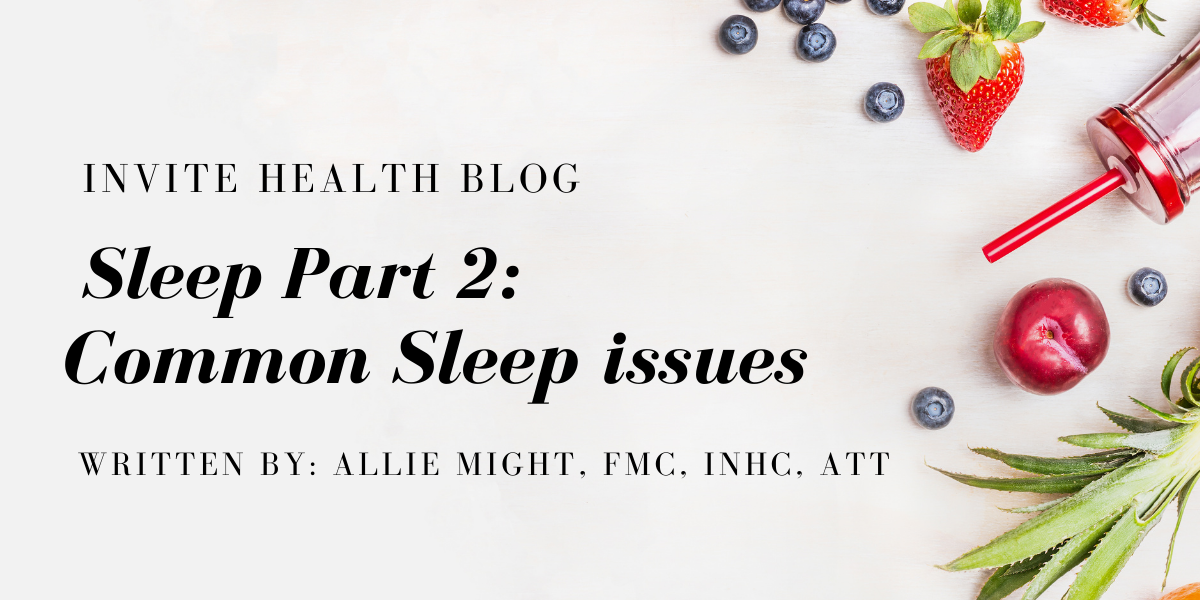Sleep, Part 2: Common Sleep Issues

By: Allie Might, FMC, INHC, ATT
When addressing sleep, there’s a few things to consider. Are you having problems falling asleep? Do you wake up and can’t fall back asleep? Have you been diagnosed with a sleep disorder? Let’s explore these and look at some strategies that may be helpful.
Let’s first take a look at some of these common issues associated with sleep and what they mean. Understanding the difference between trouble falling asleep, trouble staying asleep, insomnia, sleep apnea and narcolepsy, just to name a few, can be key in knowing how to address our own issue and questions regarding sleep patterns.
A couple of common complaints is “I can’t fall asleep” or “I keep waking up throughout the night”. According to the article “If You Fall Asleep Instantly-Is That a Good Thing? And How Long Should It Take You to Fall Asleep?” from health.clevelandclinic.org, one should fall asleep 5-20 minutes after laying down for the night. Anything that is consistent outside of this time frame may be a sign of a sleep disorder. We can also learn from an article from WebMD titled “Why Can’t I Sleep?” that there can be many reasons why this may happen. Some of the factors that may effect this are poor diet, bladder problems, pain or even a sleep disorder.
COMMON SLEEP DISORDERS
So what are some of the common sleep disorders? One that we’ve all heard of and many claim to have it insomnia. Stanford Medicine’s website has lot of insight into this disorder and even defines this as a sleep problem that may be short or long term and effects the quality of life. It also shows that while certain medical conditions may contribute to ones insomnia, many times it is lifestyle that can be the contributing factor. These can include such factors as too much caffeine intake, stress levels or even the use of electronics close to bed time. Insomnia can last from a few days to well over six months.
Another common sleep disorder is sleep apnea, and it seem to be widely talked about now in media and commercials. According to the Mayo Clinic, this is “a potentially serious sleep disorder in which breathing repeatedly stops and starts. If you snore loudly and feel tired even after a full night’s sleep, you might have sleep apnea.” There are three types of sleep apnea, Obstructive Sleep Apnea (OSA), Central Sleep Apnea (CSA) and Treatment-Emergent Central Sleep Apnea or Complex Sleep Apnea. OSA is when the throat muscles relax and block the breathing, while CSA is when the brain isn’t properly signaling the muscles that help control breathing. Complex Sleep Apnea is when OSA becomes CSA while in treatment or in a sleep study.
The last disorder that is often talked about is Restless Leg Syndrome. According to Johns Hopkins Medicine, Restless Leg Syndrome is actually a neurological disorder that causes sensations in the leg(s) or uncontrolled movements in the leg(s). This can be hereditary or from nerve damage from a variety of health-related issues. It can delay one from falling asleep and even effect the quality of sleep.
If you think you have any of these or any other sleep disorder, contact your doctor for evaluation.
SUPPORT FOR HEALTHY SLEEP
Is there anything that can help with healthy sleep? Certain herbs and extracts, like the ones found in Tranquil TX, have been shown to be helpful, such as chamomile, passionflower, and lemon balm. Medical News Today talks about a simple flower like chamomile can be helpful in relaxation and may help to induce sleep. This is because it is thought to bind to benzodiazepine receptors and may mimic mild sleep medications. The benefits of passionflower have been used for centuries by natives in the Americas as a sedative. It has also been highlighted by the National Center for Complimentary and Integrative Health for its neurological benefits. It has shown to help with lowering stress and anxiety, helping attention-deficit hyperactivity disorder and as an aid in health sleep patterns. Lastly, there’s lemon balm, which is related to mint. According to Mount Sinai, studies have shown that this herb can be up to 80% effective in alleviating minor sleep problems, particularly when in combination with herbs such as valerian.
To get some easy benefits of these herbs for a good sleep, I like to recommend adding 2 droppers of Tranquil Tx to a cup brewed chamomile or sleepy time tea.
SLEEP APNEA SUPPORT – INVITE HEALTH PODCAST, EPISODE 407>>LISTEN NOW!
REFERENCES
https://www.webmd.com/sleep-disorders/insomnia-stay-asleep
https://stanfordhealthcare.org/medical-conditions/sleep/insomnia.html
https://www.mayoclinic.org/diseases-conditions/sleep-apnea/symptoms-causes/syc-20377631
https://www.hopkinsmedicine.org/health/conditions-and-diseases/restless-legs-syndrome-rls
https://www.medicalnewstoday.com/articles/321969#takeaway
https://www.nccih.nih.gov/health/passionflower
https://www.mountsinai.org/health-library/herb/lemon-balm#:~:text=Insomnia%20and%20anxiety,reduce%20anxiety%20and%20promote%20sleep.


